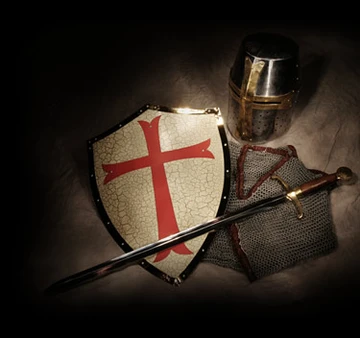“…our God whom we serve is able to deliver us from the burning fiery furnace, and he will deliver us out thine hand O king. But if not, be it known unto thee, O king, that we will not serve thy gods…”
Sunday, January 30, 2022
Lost Crusader #121 But If Not…
Saturday, January 29, 2022
The Colonel #83 More is Less
The government is best which governs least.
Friday, January 28, 2022
Know Jack #333 Write Like You’re Somebody
Critics of St. Paul complained that while he wrote these great letters, he wasn’t much in person. James Madison was adept at presenting well-reasoned written arguments. However, he was a rather sickly sort and people complained his voice was weak and perhaps a bit irritating. Whatever their physical weaknesses may have been both were skilled with a pen.

Sunday, January 23, 2022
Lost Crusader #120 The Simple Science of Experimental Christianity
What is faith? A great many Christians I know would quote for me, “Now faith is the substance of things hoped for, the evidence of things not seen.” I was once one of that number. However, beautifully written that verse is, it is a description of faith, not a definition. A definition is far more involved because of its moving parts.
Friday, January 21, 2022
Know Jack #332 The Voice of Experience
“Write what you know about.”
Mark
Twain
Twain may not be the only writer to give that advice, but he
is a great example of a fervent follower of it. Of course, that has gotten him
banned by Woke America most of whom cannot grasp the value and message of books
like Huckleberry Finn because it contains words unapproved words.
I hear Microsoft has developed a new Word tool that not only
checks spelling and grammar but points out better Woke word choices for
authors. It allows you to keep a watch on pronouns, gender bias, race, and
cultural sensitivity.
In other words, it erases the author’s voice in favor of the
collective voice. My question is, where’s the fun in that? Why read a writer’s
work but to hear his/her voice—to enter into what they know about from the
voice that lived it?
A writer’s word choices and phraseology are a window on
their life experience that allow the reader to connect on a level deeper than
the page. It’s not just the words they know, but how they string them together.
Life colors speech. Those people with law enforcement and
military backgrounds have an affinity for certain words and what they want to
convey in a scene. I have found the same true of content writers and screenwriters.
Male and female writers will describe a car very differently—sorry
non-binaries.
As a nurse, I was taught to avoid nouns and pronouns and
focus on verbs. Precise details about size and colors were very important. That’s
a skill most male nurses who own a simple eight-color box of crayons have to
work harder at than their female counterparts who own that giant 256 color box.
I have a practiced pattern of King James Bible sentence
structure and word usage that, like the book, sometimes sound awkward and confusing
to those not indoctrinated to it. Trying to sort that out with my military and
nursing speech patterns is always amusing.
What I’m trying to say is that, like St. Peter outside the
trial, “thy speech bewrayeth thee.” Who you are, and your life experience
undergirds your writing and tells something about you. That being the case,
bring that out in the open and flaunt it. It worked for Mark Twain.
Maranatha
Sunday, January 16, 2022
Lost Crusader #119 Small Sacrifices
“…thou hast slain my children, and delivered them to cause them to pass through the fire for them (idols)…”


Know Jack #398 I Object!
“A dogmatic belief in objective value is necessary to the very idea of a rule which is not tyranny or an obedience which is not slavery.” ...

-
Centuries ago, when I was just a private, it was a sign of favor and friendship to be on a first name basis with someone. The twenty...
-
“Behold your King!” Pontus Pilate Israel looked but didn’t see a savior or a king in the bloodied prisoner in Roman custody. “Away with hi...
-
“There are three kinds of lies: lies, damned lies, and statistics.” Mark Twain Twain’s observation makes me wonder where today’s world is ...







